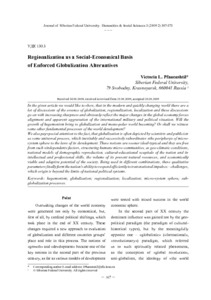Regionalization as a Social-Economical Basis of Enforced Globalization Alternatives
Скачать файл:
URI (для ссылок/цитирований):
https://elib.sfu-kras.ru/handle/2311/1005Автор:
Pfanenshtil, Victoria L.
В. Л. Пфаненштиль
Дата:
2009-08Аннотация:
In the given article we would like to show, that in the modern and quickly changing world there are a
lot of discussions of the essence of globalization, regionalization, localization and these discussions
go on with increasing sharpness and obviously reflect the major changes in the global economy forces
alignment and apparent aggravation of the international military and political situation. Will the
growth of hegemonism bring to globalization and mono-polar world becoming? Or shall we witness
some other fundamental processes of the world development?
We also pay special attention to the fact, that globalization is often depicted by scientists and publicists
as some universal process, which inevitably and successively subordinates «the periphery» of microsystem
sphere to the laws of its development. These notions are sooner ideal-typical and they are free
from such «independent» factors, structuring humane micro-communities, as geo-climatic conditions,
national models of demographic reproduction, cultural-educational «capital» of the nation and its
intellectual and professional skills, the volume of its present natural resources, and economically
viable and adaptive potential of the society. Being used in different combinations, these qualitative
parameters finally form the nation’s ability to respond efficiently to transnational impulses – challenges,
which origin is beyond the limits of national political systems. В быстро меняющемся современном мире дискуссии о существе глобализации, регио-нализации, локализации продолжаются с нарастающей остротой, отражая, по-видимому, и крупные изменения в расстановке сил в глобальной экономике, и очевидное обострение ме-ждународной военно-политической обстановки. Приведет ли рост гегемонизма к заверше-нию глобализации и становлению монополярного мира? Или мы станем свидетелями каких-то других основополагающих процессов в мировом развитии?
Здесь внимание акцентируется на том факте, что глобализация часто изображается учеными и публицистами как некий универсальный процесс, необратимо и поступательно подчиняющий законам своего развития «периферию» микросистемного пространства. Пред-ставления эти – скорее идеальнотипические, освобожденные от таких «независимых» факто-ров, структурирующих человеческие микроколлективы, как геоклиматические условия, на-циональные модели демографического воспроизводства, культурно-образовательный «капи-тал» населения и его интеллектуально-профессиональные навыки, объем наличных естест-венных ресурсов, жизнеспособно-адаптивный потенциал общества. Выступая в различных комбинациях, эти качественные параметры в конечном счете формируют способность нации эффективно реагировать на транснациональные импульсы – вызовы, источники которых ле-жат за пределами национальных политических систем.

